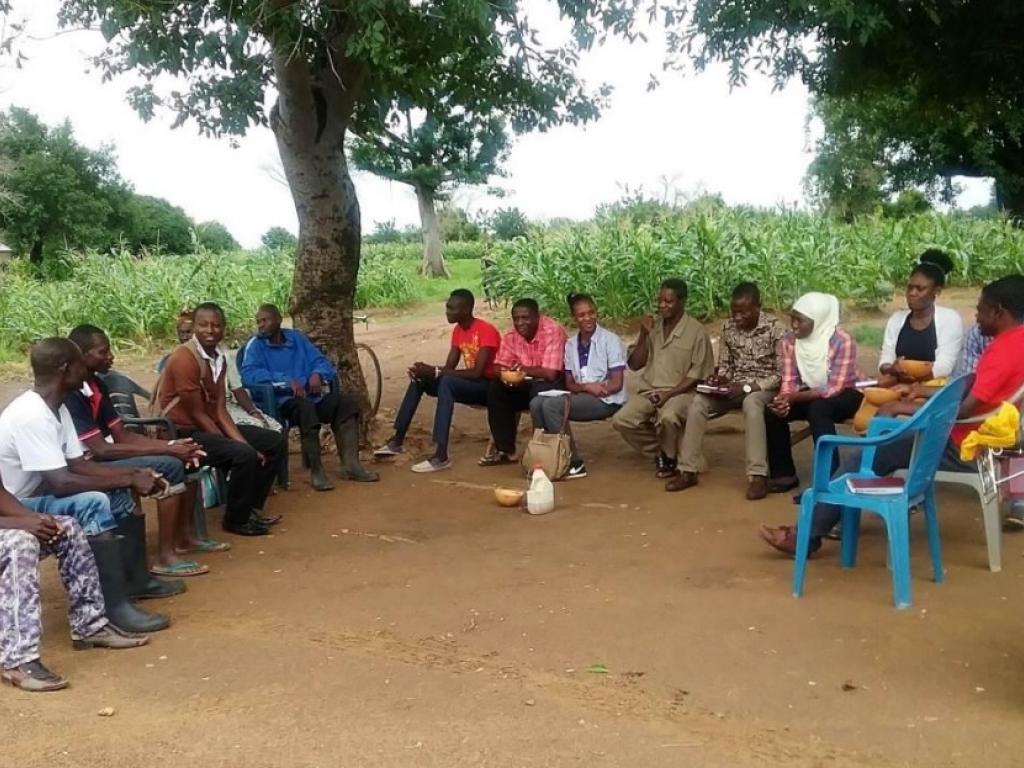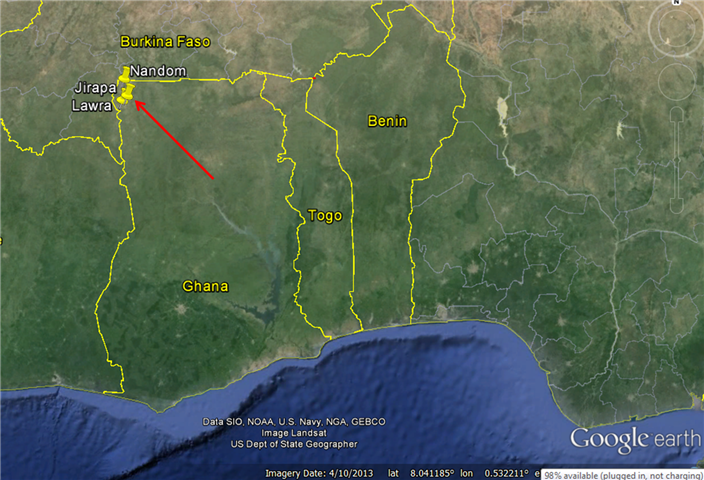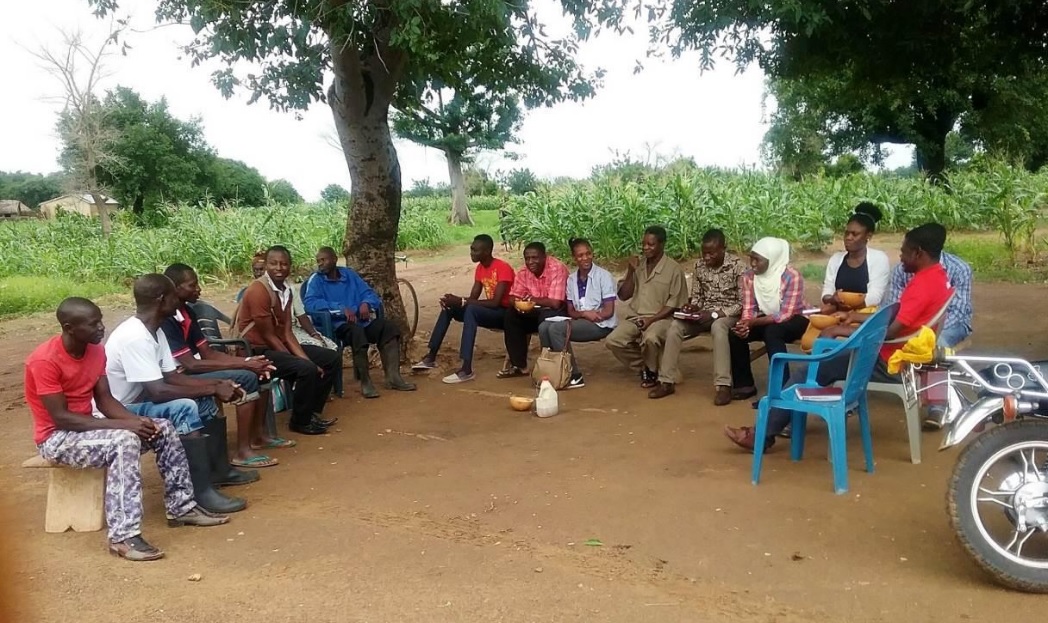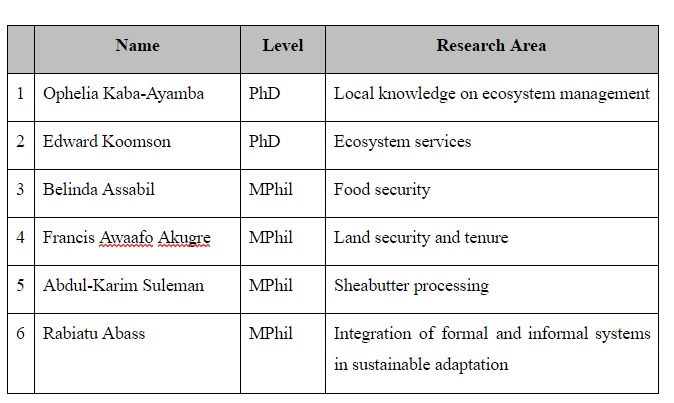ASSAR-Ghana student’s scoping visit to the Lawra and Nandom Districts

By Prosper Adiku & Prince Ansah

From the 20th to the 26th of August, 2016, the second group of ASSAR Ghana students conducted a scoping visit to ASSAR study areas in the Lawra and Nandom districts of the Upper West region.
The aim of the scoping visit was to introduce students to ASSAR research sites and to interact and network with local stakeholders. The field visit also provided students with an opportunity to select their potential research communities. This helps students to further modify their research topics and proposals. In addition, it was a great opportunity to strengthen relationships between the ASSAR project team, communities and other stakeholders in the districts.
The importance of the Regional Diagnostic Study
In early August, the students were introduced to the ASSAR Ghana team and the ASSAR project in general. During the introductory session, the ASSAR team took students through research themes and offered useful information on financing and contracts. In addition, based on the findings identified by the Regional Diagnostic Study (RDS), the students were given guidance on how to shape their research topics.
The RDS for West Africa was undertaken in 2014-15 through a partnership between START, the University of Ghana, and the International Centre for Research in the Semi-Arid Tropics (ICRISAT). The RDS was conducted to develop a systematic understanding of existing knowledge of climate change trends, impacts, vulnerabilities, and adaptation strategies. In addition, it aims to identify important barriers to, and enablers of, effective adaptation in semi-arid regions.
Building relationships in the communities
Twelve communities, six from each of the two districts, were visited. On arrival at the Lawra site the team paid a visit to the facilitator Mr. Eric Kaliebu, a retired agriculturist who is a key stakeholder for the ASSAR project in the district. He is also a reference group member for the ASSAR Transformative Scenario Planning (TSP) process.
Mr. Kaliebu welcomed the team and briefed them about agricultural and livelihood activities in the district. The students, in turn, elaborated their research interests and sought answers to questions on the type of data they needed to carry out their research activities.
On behalf of the the chief of Kalsagri, a representative gave the community’s support to assist the students in their data collection. In Kampouh community, which is known as the champion in the using good climate change adaptation practices, the students were able to interact with some community elders. The team was also warmly received by the members of the community in Zakpee. Even though the students were not able to to meet community members at Tolibri and Berwong due to their work commitments, the team established contacts with some of their leaders. As the last visit in the Lawra district, the team familiarized themselves with dry farming (crop farming during dry seasons) and shea butter processing in Orbilli.

Community engagement at Zakpee community
In the Nandom district, the team’s visit was facilitated by Mr. Tieh Kpokpori. Mr Kpokpori is a field officer and community development worker of the Nandom Deanery Integrated Rural Development Programme (NANDIRDEP) which is a key ASSAR local stakeholder. Visits to Segru, Ketuo, Zedung, Betaglu, Waleteng, and Goziir were followed. At the Nandom District Assembly, the Planning Officer promised to send relevant documents to the team, including the map of the district indicating the exact locations of all communities.
ASSAR’s thematic areas as guidelines for research
The students found out that local governance has a major role in boosting productivity in agriculture and forestry in both districts. For instance, communities like Kampouh and Goziire, in the Lawra and Nandom districts respectively, have become model communities in the adoption of good local adaptation practices which boost agricultural productivity.
When conducting thesis research, it was noted that study areas should be chosen in alignment with ASSAR’s thematic areas. Agricultural intensification is the main theme of ASSAR West Africa. Therefore, an MPhil student intending to work on the topic “Shea butter processing and its impacts on livelihood in semi-arid regions” can be encouraged to explore the linkages between shea processing and agricultural productivity.
Sharing research findings with innovative communication products
During the visit, community leaders highlighted that research results should be shared with the communities. This can be done by developing communication products which assist in the information dissemination. This will also motivate communities to respond positively to any future data collection activities in the area. In addition, with regard to research interviews and surveys, there is a risk of interview fatigue by the respondents. A specific technique should be developed to make sure that
The scoping visit was found extremely useful. The students had the opportunity to interact, ask questions and exchange contact details with stakeholders. The table below summarises the broad research interests of the students.
